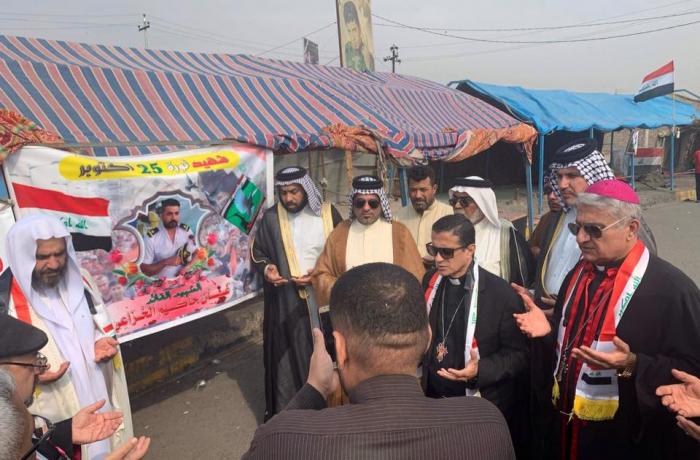The Church provides protesters with “food and shelter” every week. Schools and public buildings are closed in several southern cities. Six more people died yesterday in Baghdad in three separate explosions that no one has claimed. For Bishop Habib Jajou, ordinary Iraqis are suffering from poverty, whilst young people want social justice.
Basra – It is sad to admit it, but “the situation is a disaster” with “weapons in every corner,” said Mgr Alnaufali Habib Jajou, Chaldean archbishop of Basra, southern Iraq. In such a difficult context, “as a Church we are close to young people in the streets and provide them with food and shelter every week.”
The prelate spoke to AsiaNews about the anti-government protests that have been shaking the country since 1st October, which the police and security forces have met with violent repression.
“I agree with them (protesters),” the archbishop said. “The country needs to rebuild its infrastructure and reform the Constitution, and get rid of the confessional logic” that has caused serious damage in recent years.
This morning, anti-government protesters blocked several highways in southern Iraq. Many schools and government offices are also closed.
Fresh clashes broken out in many parts of the country with some casualties, starting in the capital, Baghdad, where three blasts were reported in different neighbourhoods with six dead.
At present, no one has claimed responsibility for the attacks, two of which involved motorbikes filled with explosives.
The authorities in the Shia holy city of Karbala have closed kindergartens, elementary, middle and religious schools, as an exceptional measure because of police firing live ammunition against crowds.
The two-day stoppage has affected Najaf and Al-Hilla, in the southern province of Babylon. In Kout and Najaf, public sector workers have stayed home. A sit-in in Basra and Nasiriyah has forced a government company to cut local oil production.
At present, there appears to be no end in sight for the wave of protests that has swept the country. The authorities have tried to control by cracking down hard: The death toll so far stands at least 350 dead and thousands of wounded.
Amid the crescendo of violence, the Chaldean Church held a three-day fast and prayer for peace. For Archbishop Habib Jajou, “Young people want social justice. They demand transparency in the management of public funds and exemplary penalties for corrupt officials.”
In their battle, protesters “are supported by families and friends outside the country.” Ordinary Iraqis, above all the young, “suffer from widespread poverty. There are millions of widows, orphans and disabled people” left on their own.
“The new generation is angry because of high unemployment, the lack of housing and education, the low-quality health system”, this in a country that earns billions in oil revenues.
What is most striking is the fact that legitimate concerns for the future have been me with “a great number of dead and wounded”.
Basra is southern Iraq’s main city and has already seen a great deal of violence in the recent past, which forced the Church to suspend all extra-pastoral activities.
The Pope’s visit scheduled for next year could provide an opportunity for renewal but the recent violence could pre-empt the trip, much-awaited by both Christians and Muslims.






